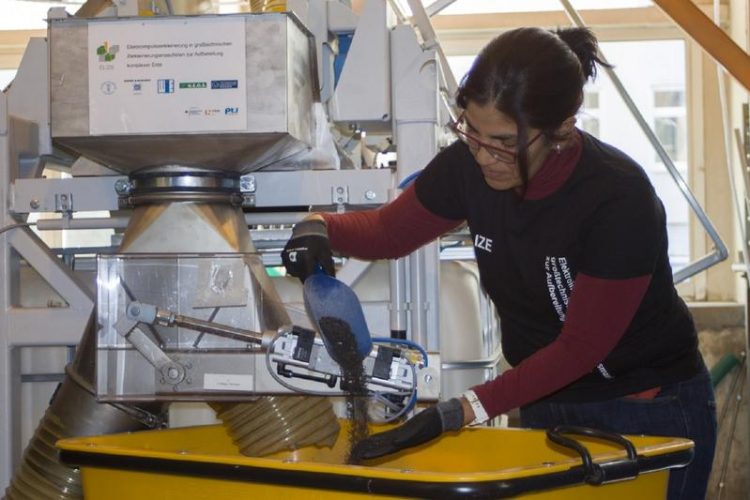New electro-pulse plant at TU Freiberg enables energy-efficient processing of high-tech metals

Margarita Mezzetti from the Institute for Processing Machines at the pilot plant. Photo: TU Bergakademie Freiberg
Strategically important metals such as tungsten or indium are often trapped in massive rocks. Due to their complex metal phases and mineralogical composition, these are often very difficult and cost-intensive to process.
Scientists at TU Freiberg and the endowed professorship for construction machinery at TU Dresden have developed an efficient and economical solution together with partners from industry.
“With the help of electrical impulses we cause small cracks in the solid and often tough rocks. These enable us to access the valuable materials contained in them more easily and to extract them more efficiently.
The combination of electric pulses and subsequent mechanical comminution makes our process particularly energy-efficient. For example, deposits that were previously uninteresting from an economic point of view can now be developed”, explains Prof. Dr. Holger Lieberwirth of the IAM.
In order to be able to test the process for different types of rock and secondary raw materials and to continuously optimise it on the basis of the results, the scientists have created a unique pilot plant.
This was built at the TU Bergakademie Freiberg using components developed by all partners. For example, the TU Dresden's Endowed Chair of Construction Machinery developed the Marx Generator, the company Werner Industrielle Elektronik developed the special electronic components for controlling and monitoring the plant, the company Haver Engineering was responsible for the machine design and programming of the process control and management of the pilot plant, and the G.E.O.S. engineering company from Freiberg was responsible for water treatment and the characterisation of the ores.
The aim is to bring the continuously operating electro-pulse technology closer to industrial applications. This is because the new plant not only offers possible applications for the treatment of primary mineral raw materials, but is also suitable for recycling.
The joint project was funded under the BMBF measure “r4 – Innovative Technologies for Resource Efficiency – Research for the Provision of Economically Strategic Raw Materials”.
Prof. Dr. Holger Lieberwirth, Phone: +49 3731 39-2558
Media Contact
All latest news from the category: Power and Electrical Engineering
This topic covers issues related to energy generation, conversion, transportation and consumption and how the industry is addressing the challenge of energy efficiency in general.
innovations-report provides in-depth and informative reports and articles on subjects ranging from wind energy, fuel cell technology, solar energy, geothermal energy, petroleum, gas, nuclear engineering, alternative energy and energy efficiency to fusion, hydrogen and superconductor technologies.
Newest articles

Magnetic tornado is stirring up the haze at Jupiter’s poles
Unusual magnetically driven vortices may be generating Earth-size concentrations of hydrocarbon haze. While Jupiter’s Great Red Spot has been a constant feature of the planet for centuries, University of California,…

Cause of common cancer immunotherapy side effect s
New insights into how checkpoint inhibitors affect the immune system could improve cancer treatment. A multinational collaboration co-led by the Garvan Institute of Medical Research has uncovered a potential explanation…

New tool makes quick health, environmental monitoring possible
University of Wisconsin–Madison biochemists have developed a new, efficient method that may give first responders, environmental monitoring groups, or even you, the ability to quickly detect harmful and health-relevant substances…



